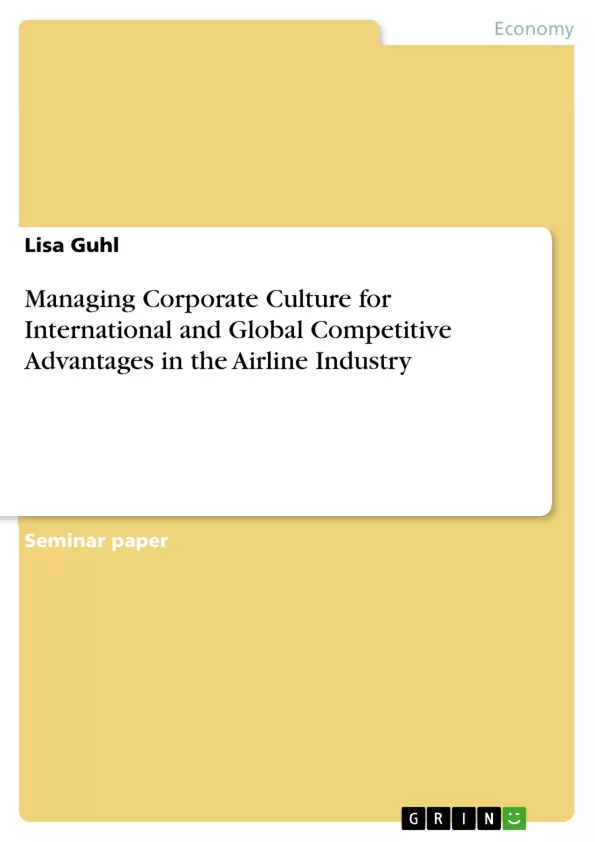Ever since globalization has started companies have been looking for ways to compete successfully on a global scale. Trends in the global environment such as rapid communication, technology innovation, and global sourcing models requiring to manage cultural differences are still challenging for many industries (cp. Yip, 2003, pp. 1–3). The airline industry being itself a reason for an increasing borderless world also faces these global trends and high competition due to expansion, consolidation, concentration, and alliances. Terrorism and rising costs for fuel, labour, maintenance, and security have not been the only threats for the industry. Also rising customer expectations e.g. regarding comfort, entertainment, experience, convenience, innovation, personalization and value for money require the airline industry to change dynamically. Moreover, airlines face demands for pollution control, corporate social responsibility, and sustainable travel. Rising competition from low-cost carriers is also relevant since their share of global capacity increased to more than 25 % in 2013. So, even if demand for air transportation has grown by an average of 9 % per year since 1960, and global airline revenues reached a new high of US$708 billion in 2013, airlines need to find ways to stand international and global competition as their environment potentially endangers profits and economic survival (cp. Lynes & Dredge, 2006, pp. 122–129; PricewaterhouseCoopers, 2014, pp. 2–3).
Inhaltsverzeichnis (Table of Contents)
- Introduction
- Problem Statement and Aim of the Paper
- Research Methodology and Structure of the Paper
- Theoretical Foundation
- Competitive Advantage According to Porter
- Resource-based View
- Corporate Culture
- Practical Implementation at Emirates Airline
- SWOT External and Internal Analysis
- Corporate Culture
- Critical Analysis and Recommendation
- Conclusion and Outlook
Zielsetzung und Themenschwerpunkte (Objectives and Key Themes)
This paper investigates the potential of corporate culture as a source of international and global competitive advantage in the airline industry. The research aims to understand how a strong corporate culture can contribute to a company's ability to outperform its rivals in a globalized and highly competitive market. Specifically, the paper explores how Emirates Airline has leveraged corporate culture to achieve competitive success.
- The role of corporate culture in achieving international and global competitive advantage
- The impact of globalization and industry-specific trends on the airline industry
- The importance of a clear and distinctive competitive advantage in a globalized market
- The challenges and opportunities associated with building and sustaining a strong corporate culture
- The specific case of Emirates Airline and its use of corporate culture to achieve competitive success
Zusammenfassung der Kapitel (Chapter Summaries)
The introduction outlines the problem statement, highlighting the increasing competition and globalization in the airline industry. It also discusses the need for airlines to define a clear competitive advantage and considers the potential of "soft" aspects like corporate culture as a source of competitive edge.
The theoretical foundation chapter dives into key concepts of competitive advantage, introducing Porter's Generic Strategies and the Resource-based View. It also provides a detailed explanation of corporate culture, highlighting its importance in organizational performance.
The practical implementation chapter focuses on Emirates Airline, applying the theoretical frameworks to analyze the company's external and internal environment through a SWOT analysis. It further delves into the specific aspects of Emirates Airline's corporate culture and its impact on the company's success.
The critical analysis chapter provides an in-depth examination of the relationship between corporate culture and competitive advantage, analyzing the strengths and weaknesses of Emirates Airline's approach. This section will likely present recommendations for improvement and further development of their corporate culture strategy.
Schlüsselwörter (Keywords)
The paper explores key concepts such as competitive advantage, corporate culture, globalization, the airline industry, resource-based view, SWOT analysis, and sustainable competitive advantage. It utilizes the specific example of Emirates Airline to demonstrate the practical application of these concepts and its impact on achieving competitive success in the global market.
Frequently Asked Questions
Can corporate culture be a competitive advantage?
Yes, the paper explores how a strong, distinctive corporate culture can serve as a sustainable competitive advantage in the global airline industry.
How does Emirates Airline use corporate culture?
Emirates is used as a case study to show how internal values and culture contribute to outperforming rivals in a highly competitive market.
What are the main threats to the modern airline industry?
Threats include terrorism, rising fuel and labor costs, and increasing competition from low-cost carriers (LCCs).
What is the "Resource-based View" in this context?
It is a theoretical framework suggesting that internal resources, like a unique corporate culture, are key to superior firm performance.
Why is dynamic change necessary for airlines today?
Airlines must adapt to rising customer expectations regarding personalization, innovation, and sustainable travel demands.
- Quote paper
- Lisa Guhl (Author), 2015, Managing Corporate Culture for International and Global Competitive Advantages in the Airline Industry, Munich, GRIN Verlag, https://www.grin.com/document/345239



